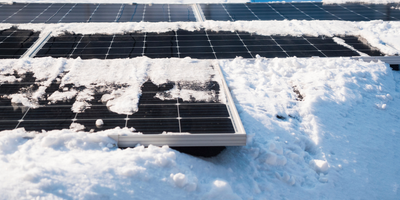Home Energy Efficiency Tips for Winter
Posted by Signature Solar on 5th Nov 2025
Solar panels work year-round, but production naturally dips in the winter. Shorter days, cloudy skies, and a lower sun angle mean your system is not generating as much electricity as it does in the summer. That is why it is especially important to make your home as efficient as possible during the colder months. By tightening up your home, you can stretch every kilowatt further and keep energy bills under control.

1. Seal Heat Leaks
Even the most efficient solar setup will not offset wasted heat. Check for drafts around doors, windows, and vents. Adding weatherstripping or caulking can stop warm air from escaping and reduce the load on your heating system.
2. Insulate for Long-Term Savings
Heat rises, which means attics and roofs are common areas of energy loss. Adding insulation, or topping up what you already have, helps keep more of your solar-powered heat inside your home.

3. Adjust Your Thermostat
Lowering your thermostat a few degrees when you are asleep or away can make a noticeable difference in winter energy use. A smart thermostat can automatically adjust your settings to balance comfort and savings.
4. Clear Snow from Panels
If snow collects on your solar panels, it can temporarily block sunlight and reduce production. Safely removing snow with a soft brush or dedicated snow rake helps restore output more quickly after a storm. Always avoid sharp tools or hot water, which could damage the panels.

5. Use Sunlight to Your Advantage
Even with fewer daylight hours, winter sun can still help. Open curtains on south-facing windows during the day to let natural light and warmth in. Close them at night to prevent heat from escaping.
6. Keep Your Heating System Efficient
A clogged filter or poorly maintained furnace consumes more energy than necessary. Replacing filters regularly and scheduling a yearly tune-up helps your heating system run efficiently and keeps it aligned with your solar power production.
7. Be Smart About Hot Water
Water heating is often the second-largest energy expense in a home. Lower the water heater temperature to 120°F and insulate pipes where possible. Combined with solar, these changes can reduce wasted energy while still giving you plenty of hot water.


